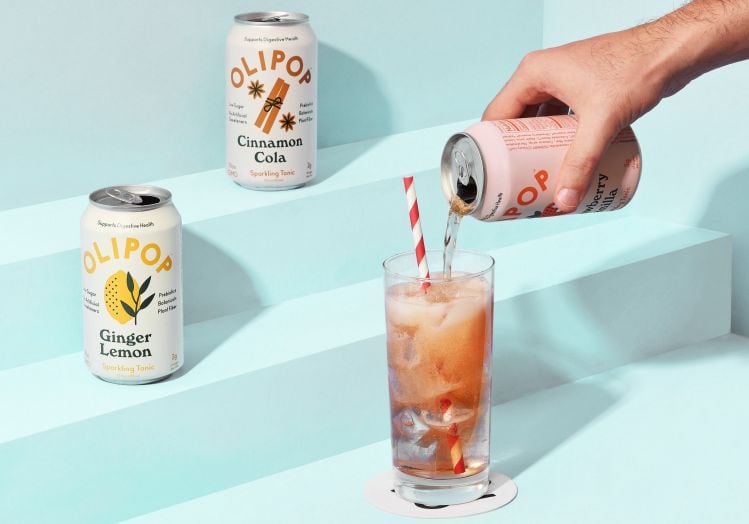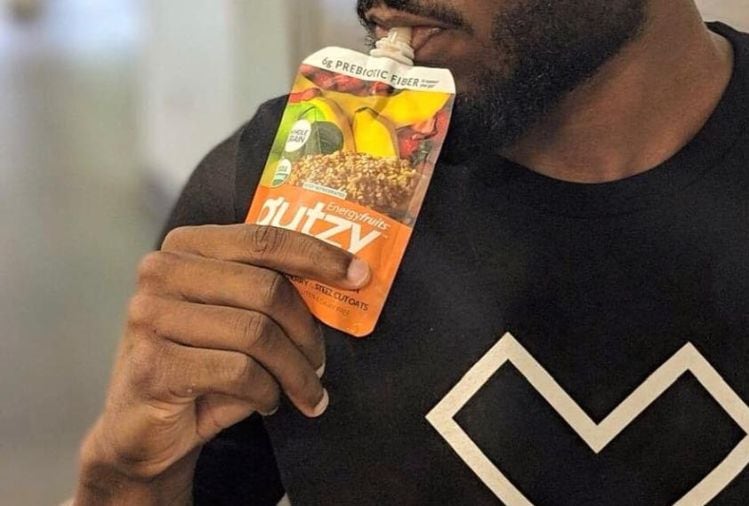The brainchild of Ben Goodwin and David Lester – who previously worked on probiotic sparkling beverage Obi soda - Olipop (MSRP $2.49; two for $4 on promotion) hit the market last fall and is now in around 70 stores including all four Erewhon stores in L.A., where it performed exceptionally well, said Lester.
“We’re about to launch our ecommerce site, we're launching in Whole Foods in Northern California in April and we’re rolling out to more [independent] stores in Southern California as well," said Lester, who was speaking to FoodNavigator-USA following the publication of a meta-analysis in the Lancet showing that eating fiber-rich foods reduced incidence of coronary heart disease, stroke, type 2 diabetes and colorectal cancer by 16-24%.
“But this wasn’t just designed for the natural channel. We feel it has broader appeal. It’s fun, delicious and lighthearted. It tastes like soda, but with only 2-3g of sugar. It resonates particularly well with women – boomers and active millennials.
“We sold nearly 5,000 cans in four Erewhon stores in November alone,” added Lester, who said there was strong demand for fun, fizzy, low sugar beverages that taste good and deliver functional benefits, without breaking the bank.
“The strawberry vanilla tastes like cream soda, the ginger lemon has a real bite to it, and the cinnamon cola has some green tea extract for people that are looking for caffeine but an alternative to Diet Coke.”
The formulation
Formulated with water, fruit juice, and stevia, Olipop features a cocktail of natural ingredients claimed to confer digestive health benefits and anti-inflammatory properties, including chicory root, Jerusalem artichoke, kudzu root, cassava fiber, cassava syrup, marshmallow root, slippery elm bark, Nopal cactus, and calendula flower.
Some of these – notably prebiotic chicory root fiber – have well documented health benefits supported by clinical data (the fiber reaches the colon intact and is selectively fermented, promoting the growth of good bacteria, which feed on the fiber, and increasing stool volume and softness).
Others (eg. calendula flower) have less data behind them, but may have antibacterial, antiviral, anti-inflammatory and antioxidant properties, says the company, which is exploring whether to conduct clinical studies overseen by microbiome researchers (Joe Petrosino and Tiffany Weir) to validate its proprietary formula – an unusual step for a start-up, acknowledged Lester.
“If this takes off, people are going to demand more data and we think it’s the right thing to do.”
'I’ve seen too many companies throw magic ingredients in a bottle and make a range of claims'
Co-founder Ben Goodwin added: "[Clinical] research is usually out of the purview of a startup but its important for us that we are setting new standards in everything we do. Microbiome research and the health regulatory environment will inevitably shift and we want to take steps to not only validate our formulation choices but be able to go in our own new directions.
"At the end of the day, after a decade of developing health products, I’ve seen too many companies throw magic ingredients in a bottle and make a range of claims. We won’t necessarily be able to prove out every idea we have but we want to test and innovate in an authentic way, and that involves doing some original research.
"We have engaged Joseph Petrosino (one of the head PIs from the Human Microbiome Project) as the head of our Scientific Advisory Board and will be working with him and a number of other top researchers to do in vitro and in vivo tests that look at microbiome shifts, blood glucose/insulin responses, and a range of metabolite outcomes (inflammation, immune markers, etc)."
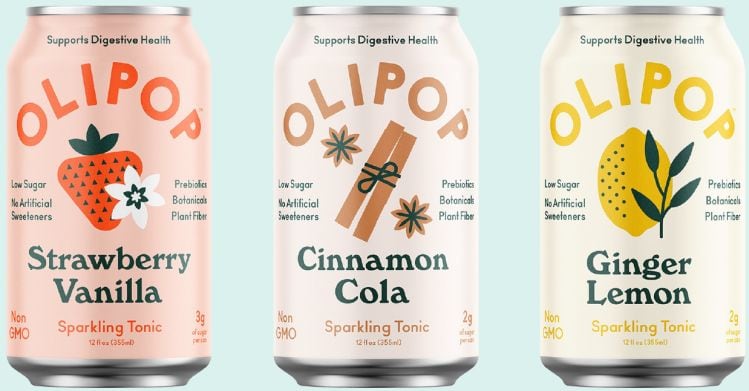
"Based on my reading of the clinical literature and the many conversations I’ve had with some of the world’s top microbiome researchers I’ve come to the conclusion that the modern industrial diet is unacceptably low in fiber, prebiotics and nutritional diversity. Just having one source of fiber/prebiotics actually contributes to the problem instead of alleviating it. I’ve selected a range of ingredients that balance taste, mouthfeel, research, historical use, low incidence of allergy and accessibility."
Ben Goodwin, co-founder, Olipop
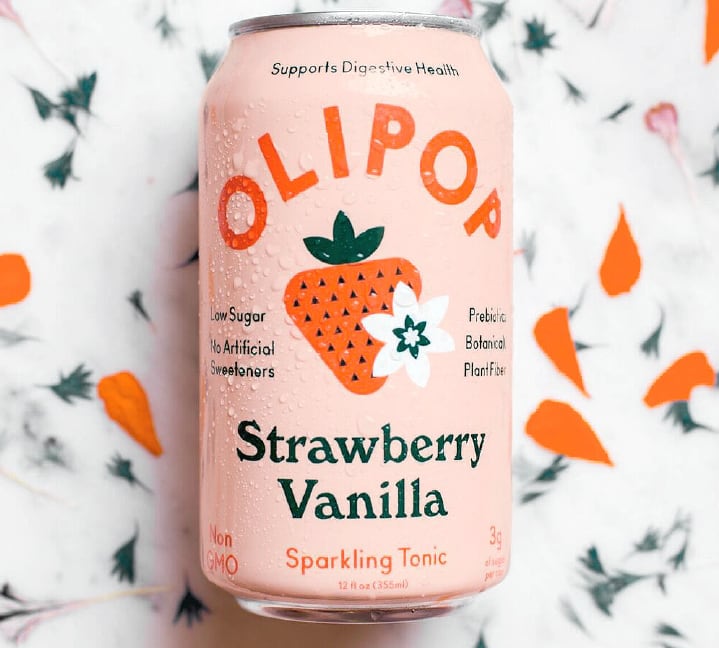
Ingredients list, Olipop strawberry vanilla: Purified water, strawberry juice concentrate, OliSMART (chicory root, jerusalem artichoke, kudzu root, cassava fiber, cassava syrup, marshmallow root, slippery elm bark, nopal cactus, calendula flower), apple juice, lemon juice, juice, stevia, pink rock salt, vanilla bean essence, strawberry essence extract.
Each 12oz can has 30 calories, 9g fiber, and 3g sugar.
‘The average American gets less than a third of the WHO recommendations for fiber’
While nutrition scientists are still unlocking the secrets of the gut microbiome, consumers increasingly understand that what we feed the army of microbes that line our digestive tracts may be intimately connected to our wellbeing, said Lester, who said this had helped to shift the consumer conversation about fiber beyond ‘roughage’ and ‘regularity’ towards concepts such pro- and prebiotics.
Prebiotics – fibers which promote the growth of beneficial bacteria in the gut - are fermented in the large intestine, producing beneficial short chain fatty acids (SCFAs), which are associated with a series of gut and immune health benefits. One of these SCFAs, butyrate, also appears to stimulate the production of neurotransmitters such as serotonin (click HERE), and anti-inflammatory cytokines (click HERE), which could reduce stress signals on the brain.
While most consumers may not be aware of this, they are starting to see phrases such as ‘prebiotic fibers’ on more food labels and understand that they need more fiber in their diet, said Lester.
“The average American gets less than a third of the WHO recommendations for fiber ... and if you’re taking probiotics without addressing underlying diet and digestive health, it’s like planting seeds in the desert and hoping a garden is going to grow. Even with the most extreme interventions like fecal transplants, if you don’t change your underlying diet, the gut microbiome just reverts back to where it was. We need more fiber and nutrient diversity.”
Goodwin added: "The digestive microbiome is at the root of the brain-gut axis which produces the lion’s-share of our neurotransmitters and hormones. These two compounds arguably shape your life experience and overall health more than anything else and it’s nearly impossible to overstate their importance."
- Read the latest research on the health benefits of dietary fiber in The Lancet HERE.
- Main picture by Andi Devon
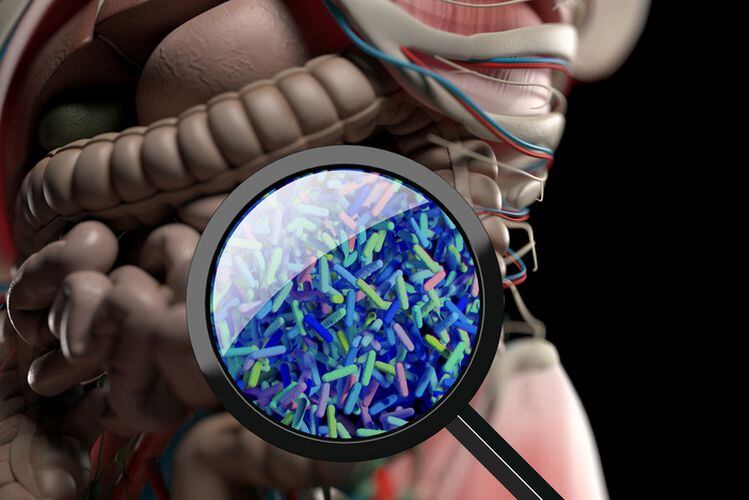
How are US consumers thinking about digestive health? For some consumers, digestive health is about avoiding foods that make them feel bloated or lethargic, for some, it’s about ‘roughage’ and ‘regularity,’ while for others it’s about keeping their guts happy with prebiotics and probiotics, says Hartman Group.

